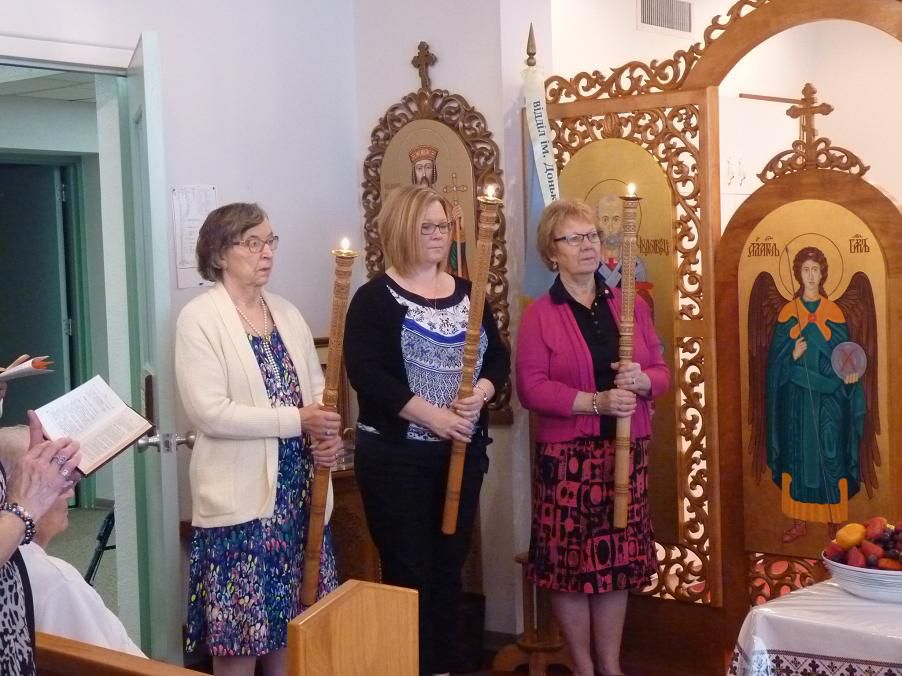
7th Sunday after Pentecost (Romans 15:1-7)
By Fr. Evan Maximiuk
In the name of the Father and of the Son and of the Holy Spirit.
Glory be to Jesus Christ.
It is a joy and a blessing to be with you today. More than likely, at some point in our lives we have probably said, “I don’t like that person.” Or, “That person gets on my nerves.” We may have even said, “I hate that person.” We may have been wronged by a person. We may have had a disagreement, a fight, harsh words. It may have been with a co-worker, a neighbour, a family member, a friend, and yes, it may have even been with a fellow parishioner. Each of us, at one point or another in our life, has not liked someone. We have all fallen victim to anger. We have either been a victim of or a perpetrator of slander, of gossip, of lies.
We try not to be like that. We try to love each other and yet it is so easy to fall victim to the temptation to talk behind someone’s back, to undermine them, to make them look less in the eyes of the other people. If we can somehow bring down someone we don’t like, or we don’t agree with, we feel that we have done something good. We will slander them, talk behind their backs, complain about them.
Slandering someone is a vice, it is a sin that is mentioned many times in the Holy Bible. St. Anthony defines slander as this: “It is every sort of wicked word we dare not speak in front of the person about whom we are complaining.” When we slander someone, when we talk behind their backs, when we gossip about them, lie about them, we reveal ourselves to be cowards. We are cowards because we don’t even have the courage, the guts, the fortitude, the common decency to look that person in the eye and tell them to their face what the problem might be.
So why am I talking about slander in church? Because the reality is that in here, within these four walls, within the different organizations associated with the church, there is a nasty habit of slander, of gossip, of undermining each other. People don’t like the priest. What will they do? Talk behind his back and try to undermine his authority. People don’t like the executive. What will they do? Try to undermine their authority. People don’t like the women’s organization, the men’s organization, what will they do? They will slander it, undermine it. Slander is saying everything nasty thing we would want to say to the person, but don’t because we don’t have the courage, but behind their backs, we are very brave.
So why talk about slander? Because it is a problem that has plagued the Church ever since its inception. If we read the holy epistles we will find that the early church was not immune to this problem. There were disagreements. There wasn’t unity. One side believed in doing things one way and the other side believed in doing it their way. Both sides believed their way was the best. Sound familiar?
So how do we deal with this problem, and let me be honest with you, it is a problem. Our Holy Church is not immune to it. Each of here has probably heard of a church that has been torn apart for whatever reason. And when that happens it is a tragedy.
St. Paul, in the epistle to the Romans tells us clearly how we are to deal with it. “We then who are strong ought to bear with the scruples of the weak, and not to please ourselves. Let each of us please his neighbour for his good, leading to edification.” St. John Chrysostom explains this statement this way, “If one is passionate, or insolent, or has any failing of this kind, bear with him. And how is this to be? Are you powerful? Let the weak have trial of your power. Let him come to know your strength; please him. And so if you are rich or in power, do not please yourself but the poor and needy, because in this way you will at once have true glory to enjoy, and be doing much service.”
So what this means is that if you don’t like someone, if they have failings of any sort, we are to bear with that person. The strong ought to bear with the scruples of the weak and not please ourselves. It is so easy to tear a person down, to hurt them with lies, with slander, with verbal attacks, with gossip, to exploit their faults and weaknesses. Somehow we feel better about ourselves, we feel stronger and that could not be further from the truth. If we claim to good and faithful Orthodox Christians, full of Christian love for one another, we will do everything in our power to live up to the commandment given to us by St. Paul, and that is to bear with those around us. To practice patience, forgiveness, love, compassion.
You see, the rule of the most perfect Christianity, according to St. John Chrysostom, is CARING FOR YOUR NEIGHBOR. Even though we fast, pray, attend church services, donate to the church, work for the church, if we take no thought for our neighbour, we have done nothing great. We will have failed in our Christian mission, our Christian journey. All the fasting we do, all the denial of putting things into our mouths, our bodies, means nothing if we spew lies and slander. All the prayers asking for God’s mercy and forgiveness means nothing if we can’t pray for someone we don’t like, for someone who has angered us.
St. Paul, in this epistle, tells us, “Now may the God of patience and comfort grant you to be like-minded toward one another, according to Christ Jesus, that you may with one mind and one mouth glorify the God and Father of our Lord Jesus Christ.” That is what we are supposed to do with our lives, with our thoughts, our voices. Glorify God. If we are spending time complaining about the priest, about the executive, about how things are being done in the church, about the person you sit beside in church, how can you give glory to God?
I have not been a priest for a long time. I know that not everyone will get along with everyone else in a parish. It is just a reality. But if we all could just maybe start making that little extra effort to try, just think of what a parish could accomplish. If we learned to be a bit more patient. A bit more understanding. A bit more forgiving. If we put our ego aside and accept that what we do here is for the glory of God, not our own glory. The lives we lead are not for our own glory, but for the glory of God. If we learn to let go of past wrongs and realize that holding onto a grudge doesn’t make us stronger or better. It lessens us, makes us weak. If we would just learn that the church has existed before us, during us, and will exist after us, maybe we could learn to actually enjoy it.
The rule of the most perfect Christianity is caring for your neighbour. Look to your left. Look to your right. Look in front of you. Look behind you. That is your neighbour. I want to leave you with this thought: If the goal of our life is heaven, is life with God in paradise for all eternity, these are the people you are going to be spending it with and if you can’t get along with them here on earth, what is eternity going to be like?
Amen.

